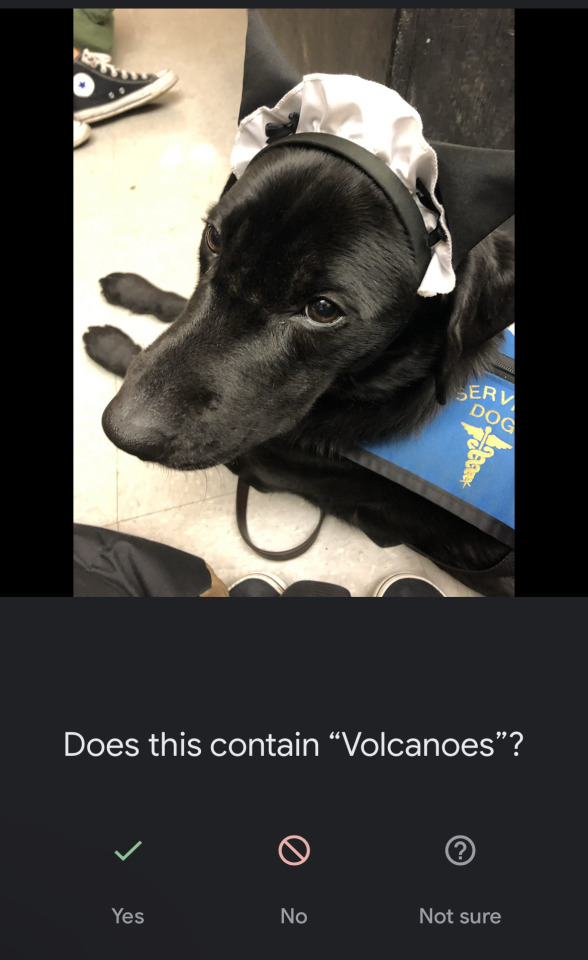
Uhhhhh
24 posts
Candy4dinner - Uhhhh - Tumblr Blog




This was taped up on the bus stop lmao
What a good idea! Imagine just having hundreds of voicemails and it’s just strangers screaming- no introduction💀 would definitely cheer me up
This is also my first post to put an end to my tumbler lurking (aside from reposts)
Just started this game and I love the shit poor Kim has to put up with 😭






harry absolutely has a collection of weird and oddly specific t-shirts he doesn't even remember having bought (designs stolen from shirts that go hard
Aro Books For Aro Week
It's Aro week! I've read more ace books than aro books, but I did want to share a few.
1) Common Bonds. This is an anthology where each story features an aro characters - how cool is that? https://bookshop.org/books/common-bonds-a-speculative-aromantic-anthology/9781775312970
2) A Promise Broken by S.L. Dove Cooper. This is the first aro rep book that I read, so I'll always remember it just for that, but it's also a lovely tale about grief. I will say it's a very active read - the reader has to put together a few clues about the story because the narrator is mostly an unreliable child. https://dovelynnwriter.com/books/a-promise-broken/
3) Making Love by Aidan Wayne, though the aro rep is small. It's noteworthy cuz Leeta comes from a society that is typically aro and she's an exception, falling for an ace cupid. This book is just the fluffiest. https://www.amazon.com/Making-Love-Aidan-Wayne-ebook/dp/B01MRA15MR
4) The Dragon of Ynys by Minerva Cerridwen. This is a cozy, low-stakes fantasy with an (older!) aro-ace knight on a quest to find a missing person. Queer rep all around. https://bookshop.org/books/the-dragon-of-ynys/9781945009686
5) Tarnished are the Star by Rossie Thor. This book got a lot of support from the ace community, but the character is actually aroace - both! If you like steampunk, but want it in space, this is for you. https://bookshop.org/books/tarnished-are-the-stars/9781338312270
6) The Lady's Guide to Petticoats and Piracy by Mackenzi Lee. Felicity is aro/ace and is far my fav rep I've read. You know right away she'd rather pursue science than marriage & then whoops! She's tangled with pirates. While it's the second in a series, they're world series so there's no need to read book 1 to understand this one. (I think this one is better anyway.) https://bookshop.org/books/the-lady-s-guide-to-petticoats-and-piracy/9780062795335
7) Hazel's Theory of Evolution by Lisa Jenn Bigelow. This one is another aro/ace MC, but it's so casually queer w/ other identities and disabled rep. I love it. Noteworthy for being an MG read and contemporary. All other books on this list are SFF and either adult or YA. https://bookshop.org/books/hazel-s-theory-of-evolution/9780062791177
8) In the Ravenous Dark by A.M. Strickland. I devoured this book last year, but know it's an *upper* YA dark fantasy with a lot of necromancy and violence. Aro/ace side character, but also poly rep. Did want to call out there are spicy scenes in this book! It may not be for every aro-ace reader. https://bookshop.org/books/in-the-ravenous-dark/9781250776600
9) Returning to You by Gwen Tolios. A contemporary romance between two women, both of whom are bi, where one is ace and one is aro. They fake-date for one set of parents, while the other's dad is like 'omg you like her'. https://www.amazon.com/Returning-You-Gwen-Tolios-ebook/dp/B0B4FDYNP6/
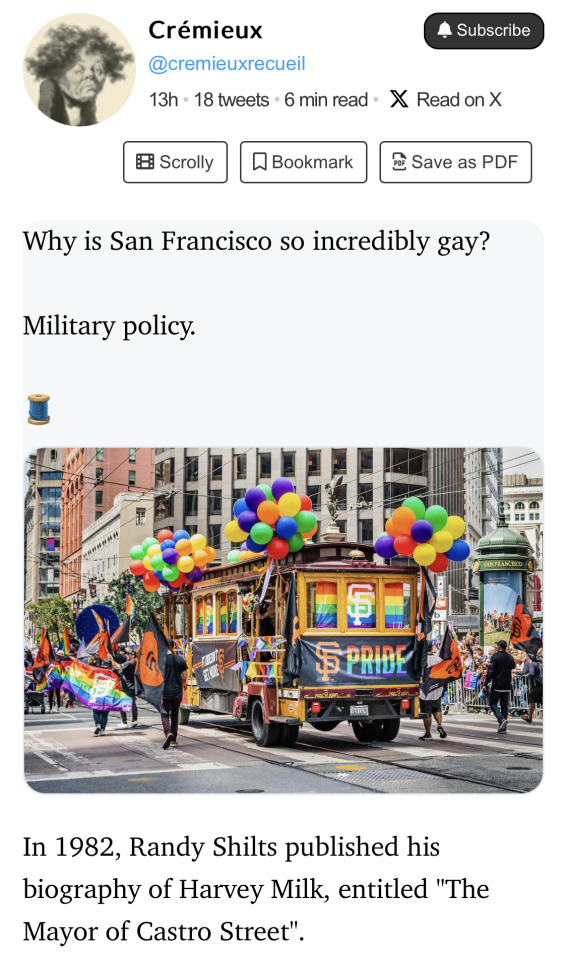
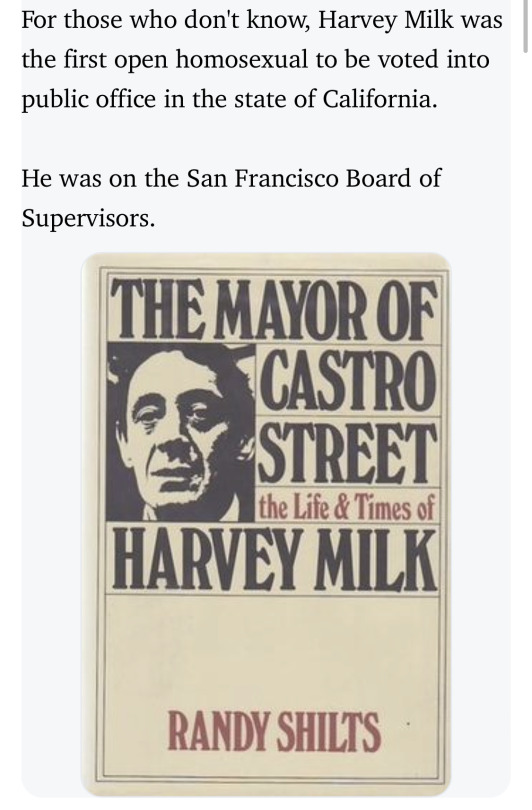
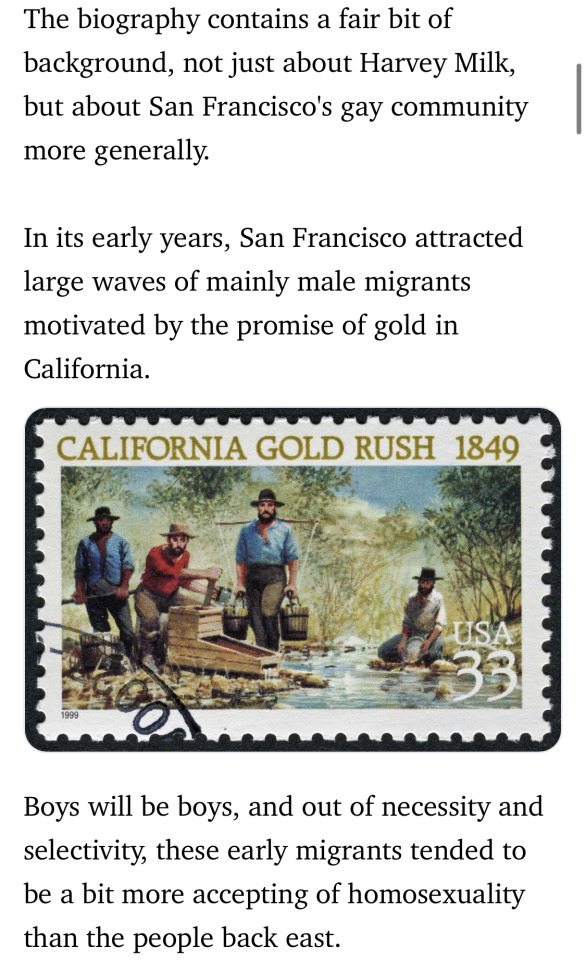


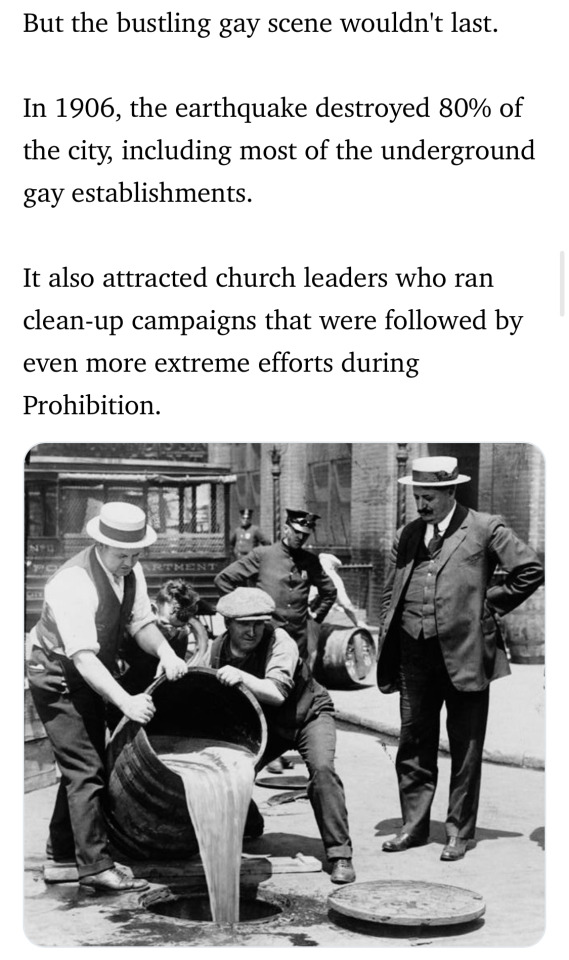
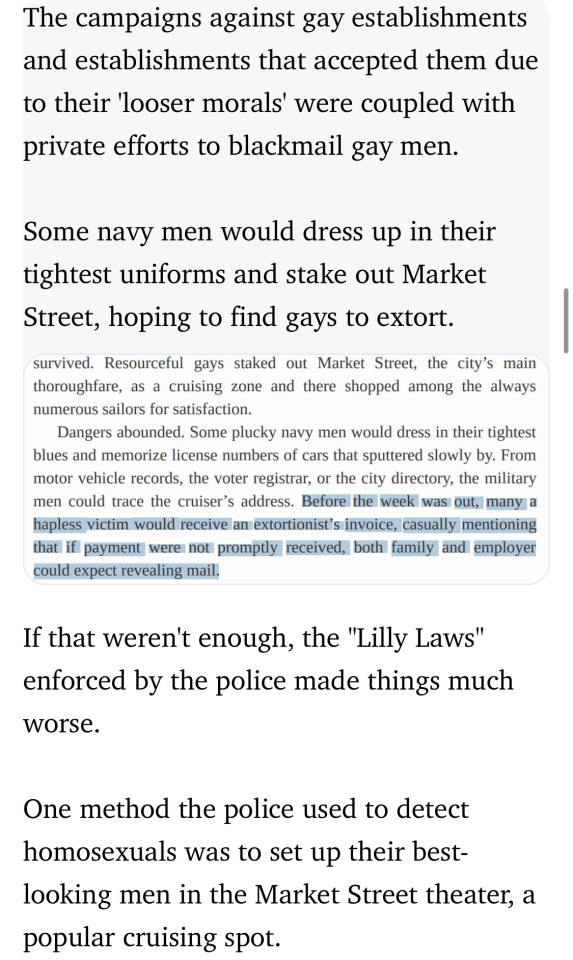






I have never once eaten a pastry-or any food at that- and gotten out stain free🙂↕️
eating pastries is so humiliating cause you'll be having the time of your life having it and then when you're finished you look down and you're covered in flakes and sugardust like fuuuck now everyone is going to know i'm a messy pastry whore

Art by Igor Pessoa
May’s Theme: #BarbarianConqueror
Presented by CDQ Magazine
Discover the artists of the Character Design Challenge community and the current Theme of the Month in our Facebook Group! And when you repost your design on our Patreon page, you can also win awesome prizes every month and choose the future themes!
RULES | WINNERS | MAGAZINE | BOOKS
Saving to buy later 🤭

Celebrate Pride with Tor Publishing Group!

The Water Outlaws by S. L. Huang
Mountain outlaws on the margins of society, the Bandits of Liangshan proclaim a belief in justice—for women, for the downtrodden, for progressive thinkers a corrupt Empire would imprison or destroy. They’re also murderers, thieves, smugglers, and cutthroats. Together, they could bring down an empire.
Now available in paperback!
Somewhere Beyond the Sea by TJ Klune
The long-awaited sequel to The House in the Cerulean Sea is a story of resistance, lovingly told, about the daunting experience of fighting for the life you want to live and doing the work to keep it. Welcome back to Marsyas Island—home to six magical and purportedly dangerous children. This is Arthur’s story.

The West Passage by @jpechacek
When the Guardian of the West Passage dies in her bed, the women of Grey Tower feed her to the crows and go back to their chores. No successor is named, and no hand takes up the fallen blade, so the West Passage—the ancient byways of the beast—goes unguarded. This is a weird and delightful journey across a deliriously medieval landscape where decay thrives in abundance and giant Ladies rule a palace the size of a city.
Blood Debts by Terry J. Benton-Walker
On the thirtieth anniversary of the largest magical massacre in New Orleans history, Clement and Cristina Trudeau mourn their father and care for their sick mother. But their mother isn’t sick, they learn: She’s cursed. Cursed by a member of the same magic council over which she used to preside. Cursed by someone who will come for Clement and Cristina next.
Now available in paperback!

Bury Your Gays by @drchucktingle
After so many years, Misha’s big Oscar moment is here. All he has to do? Kill off the gay characters in his long-running streaming series, “for the algorithm.” Misha refuses, but that’s hardly the end, because monsters from his old horror movie days have begun to step out from the silver screen and stalk him.
The Brides of High Hill by Nghi Vo
The Cleric Chih accompanies a young bride to her wedding to Lord Guo, the aging ruler of a crumbling estate, but amid the elaborate courtesies and extravagant banquets, they realize something haunts the shadowed halls. As the big night nears close, Chih will learn that not all monsters dwell in shadows; some hide in plain sight.

Remedial Magic by Melissa Marr
1) An unassuming librarian falls in love with a powerful witch.
2) Previous librarian discovers she too is a witch…
3) …and that she must attend magical community college to learn how to save her new world from annihilation.
Swordcrossed by @fahye
Part-time con artist / full-time charming menace Luca Piere didn’t expect to get blackmailed into teaching a chronically responsible merchant Matti how to wield a sword. He also didn’t expect to find his charge so inconveniently handsome, or to get so entangled in his tale of intrigue, sabotage, and matrimony.
It’s important to read Swordcrossed because while you’re reading gay fiction, you can also study the blade.
Celebrate Pride with more titles from Tor Publishing Group here!
Y'know, I think I figured out why the Hells still feel like a new low-level party to me, even though they're level 13 and almost 100 episodes in.
I don't quite think it's the lack of conversations, or the fact half the party's plot hooks are big ties to past campaigns - though that definitely plays a part.
... Bell's Hells still primarily rely on quest givers.
Most of their goals are given to them and do not feel organic to the party, and constantly remind us that the Hells are pretty much never the most powerful people in the room. Which is usually something you see with a low-level party.
NPCs offering jobs is not a bad thing; it's a very common plot hook. Matt has been extremely skilled with using NPC quest givers in those two campaigns. Not only do they provide an obvious plot thread, but they can put the party in the path of others (say, the Nein running into the Iron Shepherds while doing a job for the Gentleman and everything that came of that). And the Hells had a solid start with it too - Eshteross was an excellent quest giver!
The problem is that Bell's Hells have never really not had a quest giver.
Maybe it's a byproduct of the more plot-heavy structure of this campaign? But while prior parties have felt like they decided on their course of action and what they prioritized, Bell's Hells feels less like level 13 (13! Level 13!) experienced adventurers and more like an MMO group clicking on the exclamation point over an NPC's head. Where does the plot demand we go next? Who do we report back to?
They're level 13.
At level 13, Vox Machina had just defeated a necromantic city-state to clear their name and Percy's conscience. And, you know, the Conclave just destroyed Emon. No one was explicitly telling the group to gather Vestiges and save the world (though Matt guided them there), and they were usually among the most powerful people in the room. They chose which Vestiges to prioritize, which dragons to tackle when, even if the over-all plot was pretty clear.
At level 13, the Mighty Nein were celebrating Traveler Con (another PC goal, I'll note) after brokering peace between two nations, accidentally becoming pirates and heroes of the Dynasty. The Nein regularly chose what to do based on personal goals, not grand ones. Though definitely smaller fish than Vox Machina at this level, they were very independent and gaining solid political clout.
While we're at it: level 13 is one level lower than the Ring of Brass, who had a huge amount of sway over Avalir. They ended the world, and also saved it, while in the grand scheme of things being only a smidge more powerful than Bell's Hells are now.
Can you really see the Hells wielding that amount of influence, when they're constantly being told what to do next?
The god-eater might be unleashed, so Bell's Hells have no time to do anything but what is asked of them. No time for therapy unless stolen from Feywild time, no travel on foot and late-night watches. They haven't even had time to grieve FCG. Percy was grieved in the middle of the Conclave arc. Molly was grieved when half the party was still in irons.
Matt is in the very unfortunate spot of not being able to give the Hells the same agency as the other two parties. Not only because of the world-ending plot introduced so early on; they are surrounded by characters they know (and the cast knows) are stronger and wiser than them - the familiarity of the past PCs and NPCs is to their disadvantage.
Why would the party reasonably ignore Keyleth's task that will help save the world and go off on a romp? Why would the cast when they know well Keyleth has to be sensible and with the best intentions in mind? The stakes are just too high.
It means that the Hells still feel like they're running errands instead of pursuing their own destiny. Their accomplishments are diminished as just being parts of a to-do list, and any stakes feel padded by several Level 20 PCs/NPCs standing 5 steps away ready to catch them.
This isn't Bell's Hell's fault, nor is it Matt's. It could be amended, I think, if the Hells are really left to their own devices for a long period of time without support and shortcuts (like during the party split)... which would be really tricky to pull off at this point in the campaign.
They're level 13. They're big fish, but they're stuck in a pond full of friendly sharks, so they don't feel big at all.


BLOG DIRECTORY AND ABOUT - Check Read More!
Keep reading





Weekend stream comms open! 6 slots available, $90 each. These will be drawn live on stream this Saturday and Sunday (each day starting around 2 p.m, GMT+01:00) Claim a slot via this form!
Holy shit that’s amazing
love me. love me. love me.
I love TSH
TSH spoilers:
I feel like we as a fandom do not talk about Henry’s symbolism in TSH enough. Like, that dude is the literal embodiment of death, and I just think it’s so damn cool. I mean, his whole obsession with language and literature stemmed from the fact that he almost died in a car accident. And then every death we see in the book (the farmer’s, Bunny’s, and his very own) is directly at his hands. The others were accomplices, sure, but Henry’s the one who takes action every time. And in Francis’s failed suicide and Richard’s near death in the epilogue, they both see Henry, not Bunny or Charles or what have you.
Henry is not only obsessed with death, he IS death. He’s the reaper who’s friends toy with their mortality all the time through drugs and booze. The reason they all admire him is not only because of his size and stature and brilliance; it’s because he’s dangerous. If beauty is indeed terror, than he’s the most beautiful of them all. They all have the life preservation skills of a fly, so of course they love Henry. And of course his actions constantly bring them closer to danger and death.
Not at this ep yet
Subtext and Culture, Young Royals, Season 3, Episode 3
Episode 3 picks up the day after the camping trip, and Wilhelm calls his mom to check on her. She dumps a massive guilt trip on him, maybe unintentionally, and Wilhelm is feeling a little bit down.

Culture: These are Swedish studentmössor. They originated in the 1800's among Nordic university students and they wore them as a common marker. Later, they were adopted as graduation caps for high school students, signifying that they were now allowed to begin studying at a university.
Culture: Valborg, April 30th, is a traditional Swedish holiday where you celebrate the coming of spring with bonfires. It is also the start of graduation season for high school students, and graduates are allowed to start wearing their caps.
Cinematography: This season they started writing most on-screen social media commentary in English, despite those users being pretty obviously Swedish. I suspect it's because it saves them having to subtitle all of them, it makes it a bit easier for all the viewers to follow along.
Subtext: No, keeping up appearances is more important than mental health for the royal family, which is why this is new behaviour that Wilhelm has never seen before.
Subtext: As a reminder of the increased interest, here's a paparazzi intruding on school grounds. Also, where the hell is Malin? Isn't it her job to shoo away photographers?
Culture: Vintern Rasat is a classic Swedish song celebrating spring that's often performed by student singers at Valborg.

Subtext: Boris cleverly offers August individual therapy, something he sorely needs.
Subtext: It's of course a bit ironic that pretty much the entire fandom hates August and has decided that he can't be forgiven or redeemed. Yes, you, dear reader. But Boris lays out a way for August to start his redemption arc. Will it work? Tune in for next week's episode!
Culture: These usernames reek of white supremacy. Norse mythology references are very popular, and 88 means H*il H*tler, so that's the kind of people we're dealing with. The show is also foreshadowing what's gonna happen at the end of the episode.
Blink and you miss it: Linda made Pabellón, a Venezuelan dish. In season 1 we didn't know where Linda was from, but in season 2 she was canonically made as being from Venezuela, just like Omar is in real life.
Subtext: I think August actually cares, Kristina is family to him too, but Wilhelm refuses to treat him as family, so he lies about how she's doing. Not very convincingly, though.
Cinematography: This is an absolutely hilarious shot with a bunch of students anxiously peering out through the windows as the dreaded enemy arrives: Skolinspektionen! Dun-dun-dun!

Blink and you miss it: There's a rainbow flag on the board to the left.
Subtext: Vanessa totally knew she interrupted a makeout session between our boys. Oh, and there's a lot of purple in these two scenes, colour theory exploded with joy.
Subtext: Simon will be proven wrong, someone will be honest.
Subtext: It's also ironic that Simon joins the rest of the Forest Ridge boys pretending to have a great meal together that is totally not stiff and awkward at all, absolutely not.
Lost in translation: Simon Walter says that May 1st is a "röd dag" - a red day, which is how Sundays and public holidays are usually marked in a Swedish calendar. "Bank holiday" is the term used in the UK for public holidays. There are 13 public holidays in Sweden each year.
Culture: Första Maj is the name of the International Workers' Day in Sweden, because it always occurs on May 1st. In defence of Henry and Walter's shared braincell, most Swedes actually don't participate, but it's a bit weird to not even know what it is.

Subtext: This entire sequence shows how Felice's dad tried to stick up for himself, but quickly learned to keep his head down instead and conform and roll with it. And it wasn't just the other students who were racists, the staff was in on it too. This goes for all the shit the students are doing, the partying, the booze, the alcohol, the bullying: The staff is in on it. They know. They're complicit.
And despite all of this, Poppe's immediate answer when asked how his time at Hillerska was, is that it was the best time of his life. This is why schools like this stay the way they are, why they never change, because they're very good and very bad at the same time. Trauma-bonding works, the kids will all get friends for life, they'll forget the shit and remember the good times. They'll become like him.
But when Felice learns what the school did to her dad, she decides to help shut it down, to stop the cycle of abuse. The reason she goes in alone is because she now knows she can't trust her dad, he's gonna defend the school, and she also doesn't want him to know that she snitched.

Subtext: In official surveys, students from schools like this generally rate them very highly. Student satisfaction is very high. Maybe they're lying, maybe they're delusional, but they sure care more about their schools than public school students.
Blink and you miss it: REAL SUBTLE THERE, SHOW.
Subtext: Keeping with the school theme, this is how students defend the shit that goes on. Outsiders are kept in the dark, you don't tell them anything, because they "wouldn't understand", they're missing the "full context", etc. Oh, I don't know shit about fashion, but Fredrika's jacket smells very expensive.
Blink and you miss it: While Wilhelm pinned a polaroid of himself and Simon prominently on his wall, August keeps a similar polaroid of himself and Sara hidden.

Subtext: Micke's redemption arc is in full swing, so why not play a song that reinforces the idea that people can change?
Subtext: August's redemption arc is in full swing, so let's cut to him nervously waiting outside Micke's place for Sara to come home, while the same song is playing. Is he gonna be a villain forever?
Blink and you miss it: Micke introduces himself as Micke af Eriksson when August introduces himself as August Horn af Årnäs. The English subtitles for some weird reason went with "Micke Eriksson of Bjärstad", but that's actually not what he says.
Subtext: Sara is pretty realistic about her expectations of her dad because she's seen this before, but this also applies to her expectations of August, because she knows that he can also slide back into his normal shitty self. Also, she's wearing a purple sweater.

Subtext: In case you forgot, August's dad also struggled with addiction, and died from it, so he and Sara actually has that in common. Maybe there's hope for this redemption arc thing?
Cinematography: I don't fucking know why they included this baking scene. It serves no purpose, and I suspect quite a few people in the production have a serious hand fetish, because what is this? What is this? Also, why are Simon and Wilhelm joining what appears to be a Manor House thing with the rest of the girls? How? Why? This makes no sense! It's very cute, though!
Subtext: Oh ok, we got a social media pic that Sara could see and feel bad for her lost friendships. But man, those Hillerska aprons! On point!
Subtext: This is unfortunately a very common thing for people on any kind of psychoactive medication. How can you tell if you need medication if you feel good right now? Is it lasting or temporary? Can you trust your own brain? Either way, fantastic conversation between Micke and Sara, which starts her on her journey to reconcile with Felice at least.
🎵 I can change, I'm not the same, not forever. 🎵

Culture: The official hat-on-putting ceremony where all the third-year students put on their hats, set to another traditional Swedish spring celebration song: Vårvindar Friska.
Culture: It's Valborg, so Hillerska has their own little bonfire. We saw some students with torches pretending to light it, but it's actually floating in the middle of the fountain so, uh, how did they do that? Normally, your local bonfire or Majbrasa is just a huge heap of wood that you set on fire.
Cinematography: Man, this is a pretty show. Look at that shot. The fire, the sunset, the pool reflection. The end of April is over a month after the spring equinox, so the days are getting longer, and the sun now sets at about half past nine in the evenings.
Subtext: Ok, let's do one more on-the-nose lyrics thing for when August sees Sara back at school. Yes, yes, he needs her.

Culture: I had to post about it immediately after watching the episode, because setting a sex scene to Uti Vår Hage is hilarious. Everyone in Sweden knows it, most people have sung it at school, it's a cute little song about enjoying your garden, flowers, and giving your loved one a wreath of flowers. I can now never hear this song without thinking about this scene. Thanks a lot, show.
Blink and you miss it: Simon fucks Wilhelm. Yay! Versatile supremacy!
Subtext: Sara is still so suspicious of her dad's behaviour, she can't make herself trust that his current good period will last.
Subtext: Even though this dialogue is about how Simon and Sara are so different, it of course also applies to how Wilhelm and Erik were different, because Wilhelm struggles with not being able to handle his duty the same way Erik could.

Culture: Alright, it's time for the actual local Första Maj event in Bjärstad. The town is probably a bit small to have a proper demonstration parade, but there's people with banners and socialist slogans, and a bunch of local organisations have joined in, including Bjärstad BK, the football club Rosh plays in.
Culture: Meanwhile, the absolutely not socialist rich kids at Hillerska are nursing their hangovers and enjoying the day off, and they're doing some yoga and playing some padel instead. As you do.
Subtext: Drugs. He looks like he's selling drugs.
Culture: These apparently confused a bunch of viewers, but they're just raffle tickets. It's one hundred numbered, rolled up, paper tickets stuck on a metal ring. When you buy a ticket you just tear it off at the perforation, and when all tickets are sold you can just break the seal on the ring and pour all the stubs in a bag or whatever so you can draw winners.
Blink and you miss it: Cute kiddo has a pride pin on his jacket.
Lost in translation: The show waited a bit with showing what it says on the banner behind them in the photo, but if you can read Swedish you immediately saw that it says KROSSA ÖVERKLASSEN - CRUSH THE UPPER CLASSES. Oh no, Simon, what have you done?

Blink and you miss it: Like a pack of rabid wolves, the social-media starved Gen Z kids rush to their phones for an hour of glorious feeding on Instagram and TikTok.
Blink and you miss it: I love Vincent so much, he's terrible, but he's just so much fun! The little fist he makes as he says "kampen" just seals it.
Subtext: The show still hasn't revealed the banner text to the non-Swedish audience, but Wilhelm immediately sees it and knows how bad it is and why Farima tried calling him seven times. Also, Vincent is just on a roll here.
Cinematography: Man, this is a pretty show. Look at that shot. Look at how they perfectly aligned the hole in the window with Simon, the police car, and the entrance to their house, as he discovers that someone decided to vandalize it.
Dude I love this show- no one follows my page this is me favoriting this to look back on later
Young Royals is anti-monarchist propaganda (always has been)
I think it’s fair to say that most of the fandom was quite happy with the finale. However, I’ve seen a handful of posts by people who were unhappy, specifically those who were unhappy with Wille giving up his place in the line of succession. These criticisms range in everything from dismissing Wille’s choice (Wilhelm has made a harsh decision without thinking of the consequences, this won’t actually make the media circus around him go away), to those disappointed in how the monarchy in general was represented (Wille could have modernized the institution, no one in the show attempted to consider how the monarchy could be good, actually). I don’t want to invalidate anyone’s feelings about the finale. If you didn't like it, that’s more than ok and I don’t want to argue with anyone about their taste.
But when it comes to criticism about Wilhelm giving up the throne, I do find myself frustrated at what I see as a fundamental misunderstanding of what this show was trying to communicate. Young Royals, plain and simple, is a story that denounces the incompatibility of antiquated and hierarchical institutions (Hillerska, the monarchy) with equality and justice.
If you’ve had the displeasure of being my fandom friend you’ll know that I’ve spent the last 3 years yelling about how this show is about abolishing the monarchy. I even wrote a lengthy fanfic with the sole excuse of having Wilhelm arrive at this conclusion. Still, I knew that whatever statement the show wanted to arrive at, we’d only really be getting to it at the end of the show.
Seasons one and two were setting up all the characters on the chessboard for the end: Wilhelm is the Crown Prince, although he does not want to be. He and Simon are in love, but Wilhelm’s role drives a wedge between them. Erik’s legacy and August's spot next in line are keeping Wilhelm in his place.
From episode one, I think the show was telling us about the many things that are wrong with the monarchy, but I don’t think it’s until season three that these discussions become more explicit. Is this why some people were disappointed by the ending? Maybe so. Still, I wanted to look at how season three in particular answers some of the questions or issues people are bringing up regarding both the monarchy and the Wilhelm’s choice.
What do you like about the monarchy?
Season 3 Episode 4 is the first time we hear an explicit discussion about why the monarchy could potentially be a good institution. I’ve seen some people complain that the show didn’t give this idea enough thought.
I completely disagree with this take: the short conversation Wille and Simon have in this episode is succinct, but still effective at presenting both arguments in this debate. A longer and more drawn out conversation would have been a bit unrealistic and probably boring to watch. These are not academics having a debate, but two teenagers who are talking about what for them is emotionally charged.
There’s also no need for a longer, more detailed discussion. Wilhelm does provide a very good answer to the question: The monarchy is there to unite the people. To be a neutral party in situations when the government cannot or will not interfere.


A quick civics lesson: In parliamentary democracies, the monarch serves as the Head of State.
This role is predominantly representative, although in many places the government is formed in the name of the monarch. This could, theoretically, grant them some political power-- since they could technically reject the winning party from forming a government. However, in most parliamentary monarchies, the King or Queen simply has to accept whatever decision is made based on election results.
However, the value of the Head of State is precisely in its apolitical nature. Regardless of who’s in power, the head of state is a neutral ambassador of the nation, both in and outside of their country. Their job is diplomatic and representative, and one that is thoroughly divorced from politics. This is what Wilhelm meant when he said that the monarchy was there to ‘unite the people’. Whenever I’ve spoken to pro-monarchy folks about their beliefs, they cite this as the reason why they like it.
It’s easy to see why Wilhlem would latch on this as his main argument to defend the institution. I don’t think there is anything inherently bad about having a separate head of state that represents the country. I don’t think the major grip with this issue is the having a head of state, but the fact that the head of state is a hereditary position. Simon says this himself twice in this episode: the issue is not that the head of state exists, but that the head of state is not an elected position. Furthemore, the head of state is a role that is imposed on a person not by their talent as a public speaker or negotiator, but by a simple accident of birth.
The job’s legitimacy or importance should not be above any individual’s right to autonomy and self-determination. Furthermore, considering that taxpayers are the ones who finance this position, shouldn’t they be able to elect who it is?
Let’s imagine a scenario where a friend tells you they’ve gone into a career because everyone in their family works in that industry, and they simply had no choice in the matter. It wouldn’t even matter if they were good or bad, they had a job in this career guaranteed from birth.
Would you not be concerned that maybe your friend is unhappy for a rather unnecessary reason? Would you not think that perhaps someone who actually wanted the job would be better suited for it? Would you think it right for a company to hire someone simply because of their family history? Would you consider any of this fair? And what is so special about monarchy that makes us have a different answer for it than we would if the question was about law or medicine?
You’ll always be famous.
Another common criticism I’ve seen is that Wilhelm will inevitably regret his decision, especially once he realizes that public scrutiny will not be going away. This is true, Wilhelm will likely always be a figure of public interest. But to me, this has always been a negative consequence of the monarchy, and I have a hard time seeing this is a valid reason why he should stay in it.
From the second we meet him, we know Wilhelm is uncomfortable with both the public attention and the scrutiny placed on him. However, this goes a bit further than that. I’d argue than more than the scrutiny itself, Wilhelm is weighed down by having to keep a public image. Because, remember folks, Wilhelm is not merely an awkward teenage boy with acne and a crush. No, no, Wilhelm is the State. Wilhelm is going to be a publicly-funded representative of the nation . This means, of course, that there’s a narrative, as he mentions himsef, that needs to be put forward. One that’s generic, serious, and unproblematic:



From the get go, Wilhelm is uncomfortable with the inauthentic and performative aspect of his role.This is a constant we see with Wilhelm in seasons one and two: every ‘performance’ he has to do fills him with nausea, anxiety, or some sort of discomfort.
In season three, Wilhelm begins acquiescing to this performance. Uncomfortable as he may be, for most of season 3 he’s accepted that this is his role. However, the attention this season shifts from Wilhelm to Simon, who’s now the one facing public scrutiny. The difference is that, unlike Wille, there’s no role for Simon to play. Nothing about who he is or what he believes is compatible with the public image the monarchy is putting forward. The only thing he can do in this situation is disappear, and Wilhelm is tasked with having to ask that of him.
I know a lot of people were exasperated at Simon’s very bad and clumsy social media presence. I’m not gonna argue that my boy wasn’t being a bit cringey, because he absolutely was. But I think the larger commentary here has more to do with the expectation that these two teenagers have to censor and edit themselves to comply with a particular PR image.
Ultimately, the criticism that Wilhelm will always be famous leads us straight back to the institution. Why does an underage boy have the same PR expectations as a politician? Why is a teenager dating his classmate + being cringe online justification for doxxing him? Unfortunately, no abdication is really going to undo any of this, and things are certainly going to be crazy once Wilhelm announces he’s stepping down .
However, this time around both he and Simon will at least have the agency to decide what they want to do with their public image, including the decision to disappear from the public completely if that’s what they want.
Queer representation
This a sentiment that has been in the fandom for some time now. This was the main argument why some people wanted Wille to stay in the monarchy. Sure, the institution has always been about bloodlines and tradition. But wouldn’t it be so nice to have Wilhelm as a symbol for the queer community? I’ve always found this idea a bit shallow. I’m not sure how much of a symbol of a queer and progressive country Wilhelm could be, when the whole idea is predicated on absolutely no one having a choice in the matter. Is it really impressive to accept the queerness of the guy you already had no choice in accepting?
There’s three scenes in season 3 where the potential Wilhelm -and by extension Simon- could have for the queer community come up. Farima brings it up in the first episode, but the framing here is reversed. Wilhelm isn’t serving the LGBTQ community by being a queer Prince, but the monarchy is using Wilhelm (and his queerness) to appear progressive.

The show, however, does humor this idea with the May 1st photo. We see what Simon and Wilhelm could potentially do for the community by simply existing as who they are: they’re inspirational. It gives Simon, briefly, hope that maybe something good could come out of this.

But this moment is quite literally framed by politics. It doesn't matter that Simon is not participating in that manifestation, anything that is slightly connected with politics is a challenge to neutrality of the monarchy. This same idea is stated more explicitly int the next episode, when Wilhelm is reviewing the options for his charity.

Ultimately, any action significant enough to be truly impactful, would be bordering the limits of what could be considered political. He's got to stick it out with these quite frankly boring and limited themes, all for the sake of staying on the very narrow lane of things that are not political.
The weight of the crown.
Stories about Kings and Queens usually carry the same fundamental tension of duty vs self.
In order to rule, our protagonist has to sacrifice themselves, usually for the sake of their country and people. The Crown is an excellent example of this type of story. Sacrifice in that series is framed as something noble and selfless.
Young Royals started out with this same fundamental tension, but the main difference is that Young Royals has framed this debate as a question:
Why should Wilhelm give himself up, his happiness, the love of his life, and his mental well-being? What’s so important and valuable about this institution that requires this sacrifice?
Wilhelm’s journey is about accepting and voicing his answer. He doesn’t want to be Crown Prince, he doesn’t want to be King.
But by virtue of taking part of this journey with him, we’re able to examine this question from a different perspective: Is this institution valuable enough to justify all of this? I think the show is inviting all of us to evaluate this situation and arrive at the conclusion that it isn’t.

Even someone like August, who wanted this, is weighed down by the realization of just how much the crown weighs. Of course, a big part of the fandom probably doesn’t live in countries with parliamentary monarchies. Still, considering the worldwide popularity of the British Royals, for example, I still think it’s a worthwhile exercise to question the validity of these institutions. Are they really worth sustaining? And if they’re not, why should we continue to drag them on into the present, citing tradition?
Agreed
I am slowly losing my mind over the shift towards video as the default media format.
I do not find this to be an efficient way to absorb information. I am bored and distracted by the time the largely unnecessary introduction is over. I can't use ctrl+f to find the specific information I'm looking for. If there are instructions to follow, I don't want to have to constantly pause and back up to the part I need.
At least give me a fucking transcript.









Kith and kin.
Sometimes peace doesn't mean a lover's embrace, it means, well, peace.
Love loses! Happy aromantic week!! To me, to you and the whole cast of Avantris characters that have not shown any sign of romantic attraction, adore you.
EDIT: Since Richie asked for Art notes, here they are:









thanks for coming to my aro-talk.

Launching my first art blogs with a small comic based on the amazing words of Ursula K. Le Guin!
night in the woods reaction images but all of them are mae because when i was screenshotting the ratio between her and all the other characters was a lot
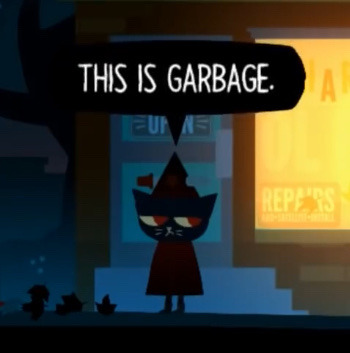

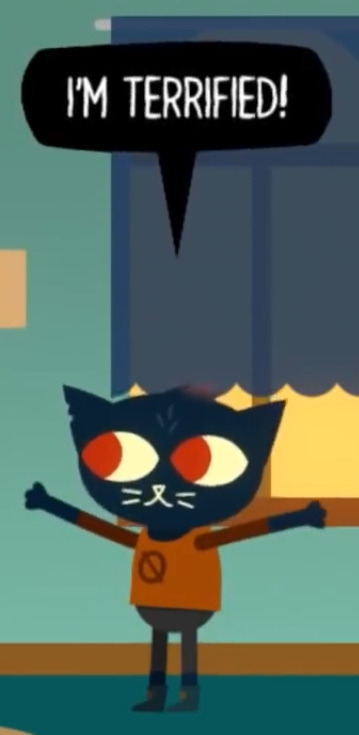


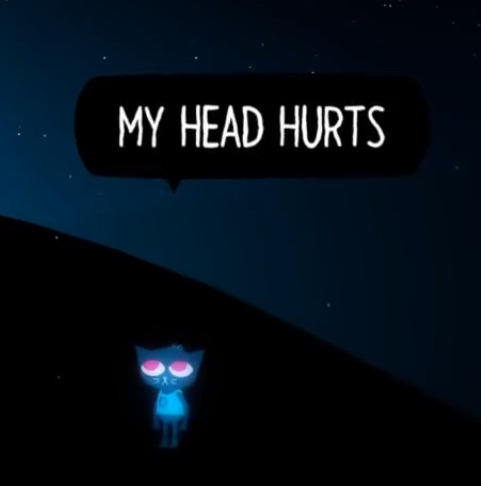
I love this book so much- It takes me a year to get through since life gets in the way but when I finish it- I take a day and just absorb it, then start reading it again lmao
I’m sure my other books feel properly rejected 😅
Tiny Goldfinch details that make me feel insane:
-Theo getting a glass of water when coming up with a lie to tell Hobie and remarking it’s what his father always did
-Theo telling his mother off for talking to someone and her saying he’s like his father and Theo’s immediate guilt
-Theo obsessively studying as if he could scrub away the guilt and shame and disgust he felt towards himself for no reason he could identify
-Mrs Barbour saying goodbye to Theo and looking like she was forgetting to say smth
-Boris taking his fathers gold lighter and putting it into Theo’s bag after he remarked on it once
-Theo and Tom cutting their palms, shaking hands and promising to be brothers 2 weeks before Tom betrayed him, leading to his mother’s death vs Theo beating Boris bloody until his knuckles were split and Boris kissing them to let him know all was forgiven, weeks before Boris stole the goldfinch. Theo remembering this all right before Boris came back and he found out abt Kitsey and Tom
-The clock being one minute to midnight in the photo of Andy and Mr Barbour.
-Andy’s innate almost prophetic fear of water. Being born with the knowledge of how he was going to die.
-Mrs Barbour inadvertently being the one to introduce Theo to drugs
-Theo’s mother saying the moon is home and Boris telling Theo his name means moon along with the quote “home is wherever I am. The center of my earth is you”
-Theo’s mother calling him puppy and the story in Theo’s suicide note of the injured puppy they couldn’t save
-Pippa being the “morphine lollipop”
-Theo’s terrifying dreams of his mother, trying to get home to her, only to realise he never could or it wasn’t actually her. Stuck haunting subway stations in his dreams never to return home again.
For future reference
Writing Tips
Punctuating Dialogue
✧
➸ “This is a sentence.”
➸ “This is a sentence with a dialogue tag at the end,” she said.
➸ “This,” he said, “is a sentence split by a dialogue tag.”
➸ “This is a sentence,” she said. “This is a new sentence. New sentences are capitalized.”
➸ “This is a sentence followed by an action.” He stood. “They are separate sentences because he did not speak by standing.”
➸ She said, “Use a comma to introduce dialogue. The quote is capitalized when the dialogue tag is at the beginning.”
➸ “Use a comma when a dialogue tag follows a quote,” he said.
“Unless there is a question mark?” she asked.
“Or an exclamation point!” he answered. “The dialogue tag still remains uncapitalized because it’s not truly the end of the sentence.”
➸ “Periods and commas should be inside closing quotations.”
➸ “Hey!” she shouted, “Sometimes exclamation points are inside quotations.”
However, if it’s not dialogue exclamation points can also be “outside”!
➸ “Does this apply to question marks too?” he asked.
If it’s not dialogue, can question marks be “outside”? (Yes, they can.)
➸ “This applies to dashes too. Inside quotations dashes typically express—“
“Interruption” — but there are situations dashes may be outside.
➸ “You’ll notice that exclamation marks, question marks, and dashes do not have a comma after them. Ellipses don’t have a comma after them either…” she said.
➸ “My teacher said, ‘Use single quotation marks when quoting within dialogue.’”
➸ “Use paragraph breaks to indicate a new speaker,” he said.
“The readers will know it’s someone else speaking.”
➸ “If it’s the same speaker but different paragraph, keep the closing quotation off.
“This shows it’s the same character continuing to speak.”










Some of my photos- I love photography so much💗








